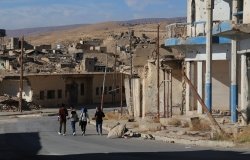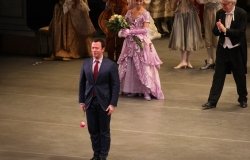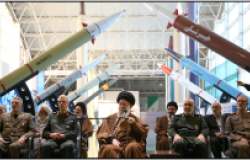Defending Human Rights around the World
Human rights activists from around the world are warning that the war on terrorism has had unintended consequences, giving governments leverage to clamp down on civil liberties, often in countries with little or no democratic tradition. As the United Nations General Assembly prepares to meet this month, these activists are voicing their concerns in public while urging the UN to make protecting human rights a higher priority.
As the United Nations General Assembly prepares to meet this month for its World Summit, human rights activists from around the world hope the UN will heed their message. That message is the need to give prominence to human rights within the UN system. They argue the war on terrorism has had unintended consequences in many countries, resulting in blatant human rights violations and strengthened dictatorships.
From Colombia to Zimbabwe to Russia, human rights activists claim their governments are infringing upon human rights, and that authoritarian governments are using the cloak of the war on terrorism to justify clamping down on civil liberties. Numerous speakers have visited the Wilson Center in recent months to voice their concerns and urge a unified, global response.
On the Front Lines of Freedom
In June, leading human rights figures from 14 countries joined leaders of U.S.-based human rights organizations at a conference in Atlanta, attended by President Jimmy Carter and the UN High Commissioner for Refugees António Guterres. The next day, five of these human rights defenders came to Washington to speak at the Woodrow Wilson Center about the current state of human rights in their countries. The group later visited Capitol Hill.
"The next few months will be crucial in seeing how human rights can become a third pillar in the UN system, alongside security and development," said Neil Hicks, director of international programs for Human Rights First, which co-sponsored the conference with the Carter Center.
"Since 9/11, the world has not become a safer place," said Yuri Dzhibladze, president of the Center for the Development of Democracy and Human Rights in Moscow, who criticized the effects of the war on terror. "Under the banner of fighting terrorism, authoritarian governments have dismantled democratic institutions, adopted anti-terrorist legislation that is a real assault on human rights and freedom, silenced opposition and the media, and attacked and harassed human rights defenders."
Dzhibladze said the United States and other western democracies should stress rule of law and human rights as integral to the fight against terror. In Russia, the war in Chechnya rages on. But, he said, the Russian public remains ill informed due to media censorship and a climate of impunity for human rights abuses propagated by public and law enforcement officials. Dzhibladze emphasized the need for policy experts, scholars, and human rights defenders to work together to reverse the democratic backslide.
In Colombia over the past decade, more than 100 human rights defenders have been killed or have disappeared, said Gustavo Gallón, director of Colombia's Commission of Jurists. But paramilitary groups, who often perpetrate these crimes, he said, usually go unpunished. He said that the government's Peace and Justice Law, passed by the Colombian Congress in June, would give paramilitary groups impunity. He observed, "This will accentuate the degree of polarization in the country all on behalf of the fight against terrorism." Given that U.S. military aid is tied to Colombia's respect for human rights, Gallón urged the United States to send a strong, consistent message that requires Colombia to uphold this obligation.
"We all observe western countries with a long tradition of rule of law now limiting civil liberties" in the war on terror, said Nozima Kamalova, director of the Legal Aid Society in Uzbekistan. She said this makes it impossible for countries without such a tradition to uphold civil liberties. Kamalova said the war on terror has helped the Uzbek government divert international attention away from Uzbekistan's human rights abuses. She described her country as a dictatorship with thousands of political prisoners, a country in which the president seeks to destroy any democratic opposition and which views human rights defenders as opposition.
In Lebanon, following the assassination of former Prime Minister Rafiq al-Hariri in February, a remarkable change occurred when the Lebanese people began a nonviolent resistance movement, resulting in the ouster of Syrian troops. "We're ambitious," said Chibli Mallat, a law professor at St. Joseph's University in Beirut, "because we have a nonviolent model that has started yielding some results." He also recommended a "Mandela model" or "[Vaclav] Havel model" for his country, in which human rights defenders serve at the helm to help democracy and rule of law take root.
In Zimbabwe, the government recently arrested 20,000-30,000 people in a "clean-up" to rid the country of illegal settlements and the situation likely affected a million people, recounted Philliat Matsheza, founding chairman and executive director of Human Rights Trust of Southern Africa. Meanwhile, the prison system there only accommodates 19,000 people. "We've observed that the attention given to terror leaves gaps somewhere else, where regimes become roguish, and where the space for democracy shrinks," he said. He said in pursuit of security, many countries are inadvertently sacrificing it. "You need dialogue and discourse," he said. "Without human rights standards, we fail to get anywhere to turn to for protection."
Political Oppression in Russia, Surrounding States
Political persecutions still occur throughout the former Soviet Union, although some states are more repressive than others. Valentin Gefter, general director of the Human Rights Institute in Moscow and the Kennan Institute's Galina Starovoitova Fellow, said at a recent seminar that political persecution is most severe in Uzbekistan, Turkmenistan, and Azerbaijan, where authoritarian regimes have rendered political activism impossible. Persecution occurs to a lesser degree in Armenia, Kyrgyz Republic, and Kazakhstan where pro-democracy orientations have allowed some degree of political activism. Russia, however, is unique, said Gefter, in that it has become increasingly authoritarian in recent years.
Political persecution in former Soviet states ranges from harassment without legal cause, to prosecuting influential and vocal political opponents (such as the oil magnate Mikhail Khodorkovsky), to accusing government critics of espionage. Unlike Soviet times, when such persecution was large-scale and ideologically motivated, Gefter said law enforcement officials and judges are influenced by a complex network of state and corporate actors, leading to politically motivated prosecutions. On a positive note, these countries have adopted new criminal codes, which are followed more frequently than were analogous Soviet laws. Still, these states are far from achieving the rule of law.
Religious Freedom in Egypt
The U.S. Commission on International Religious Freedom (USCIRF), created in 1998 to monitor the status of freedom of conscience and religion abroad, recently released its findings on religious freedom in Egypt. A critical U.S. ally and the second largest recipient of U.S. foreign aid, Egypt received mixed reviews in the report. Based on investigative visits and meetings with senior Egyptian government officials and religious leaders, the report concluded that while dialogue about religious diversity has increased, violations of universal human rights indicate that Egypt should remain on the USCIRF Watch List.
At a recent Middle East Program-USCIRF meeting, USCIRF Commissioner Elizabeth Prodromou said the United States should use its leverage to encourage Egypt to adopt the Commission's recommendations. USCIRF Vice Chair Felice Gaer said those recommendations include creating an ombudsman in the Office of the President to oversee religious affairs and repealing discriminatory laws such as the decree that requires non-Muslims to obtain permission from the President's office to build new places of worship.
USCIRF Vice Chair Nina Shea said the government has not amply monitored the violence against Christians living in rural Upper Egypt nor controlled anti-Semitic acts to an acceptable extent. She said USCIRF recommends overturning a presidential decree that bans the Baha'i community from practicing its faith.
Saad Eddin Ibrahim, a former Wilson Center public policy scholar and professor at the American University in Cairo, said the Egyptian government often uses ploys to satisfy the West which, in reality, are just masking discriminatory statutes. For example, Egypt has clamped down on free speech in the name of promoting societal stability, claiming that freedom of expression would result in rampant anti-Semitism or Islamic extremism. He said political and educational reform could buttress religious freedom in Egypt.
Ibrahim also underscored the need for a transatlantic strategy toward reform in Egypt, so that Egypt perceives the recommendations as generated by a unified U.S.-European front rather than by a lone superpower.









